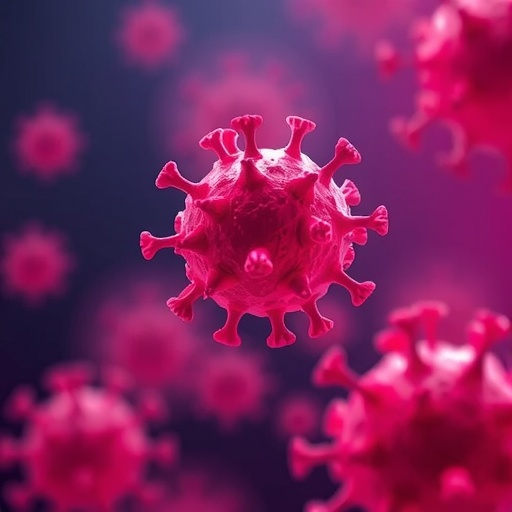In the ever-evolving landscape of COVID-19 research, a significant randomized clinical trial has recently provided critical insights regarding treatment strategies for long COVID, a condition that has perplexed clinicians and researchers alike. This study rigorously investigated the efficacy of colchicine, a medication widely known for its anti-inflammatory properties, to determine whether it could improve outcomes in adults suffering from long COVID. Despite hopeful anticipation, the trial’s findings concluded that colchicine did not offer measurable benefits in enhancing functional capacity, respiratory function, or reducing inflammatory markers in these patients.
The debilitating sequelae of COVID-19 have led to a complex syndrome—termed long COVID—characterized by persistent symptoms such as fatigue, dyspnea, cognitive impairment, and generalized malaise, long after the acute viral infection resolves. The pathophysiological mechanisms underlying long COVID remain incompletely understood but are hypothesized to involve persistent inflammation, dysregulated immune responses, endothelial damage, and microvascular dysfunction. Given colchicine’s established role in modulating inflammatory cascades, particularly through targeting microtubule polymerization and suppressing neutrophil activity, it emerged as a promising candidate for mitigating the chronic inflammatory states associated with this syndrome.
The clinical trial, spearheaded by a team led by Dr. Niveditha Devasenapathy, applied strict randomized methodologies to assess colchicine’s impact on key clinical parameters among adults with documented long COVID. The primary endpoints included functional capacity assessments—measuring patients’ ability to perform physical activities—respiratory function tests evaluating pulmonary performance, and quantification of systemic inflammatory biomarkers, which serve as proxies for ongoing immune activation. Comprehensive data analyses revealed that patients receiving colchicine exhibited no statistically significant improvement in these parameters compared to controls.
This lack of efficacy underscores the complexity and heterogeneity inherent in long COVID, suggesting that a singular anti-inflammatory strategy may be insufficient to address the multifaceted biological disruptions experienced by these patients. The trial highlights the urgent need for further mechanistic studies to unravel the molecular and immunological underpinnings of long COVID to enable development of rational therapeutics that target the condition’s diverse pathways more effectively.
Moreover, the negative findings from this robust clinical investigation hold important ramifications for future research directions and clinical practice. They caution against premature reliance on colchicine or similar agents without strong empirical support while emphasizing the necessity to explore alternative therapeutic modalities. Potential avenues warranting exploration include antiviral agents to address persistent viral reservoirs, immunomodulators tailored to specific inflammatory profiles, and interventions aimed at endothelial repair and mitochondrial function restoration.
Notably, this study contributes to a growing body of literature striving to delineate the natural history and treatment landscape of long COVID. Its rigorous randomized controlled design enhances the evidence base, providing clinicians and scientists with reliable data to inform patient management and guide resource allocation. As long COVID continues to affect millions worldwide, delineating effective treatments remains a public health imperative.
The trial also prompts reflection on the challenges of conducting large-scale clinical research amidst an evolving pandemic context, where heterogeneous patient populations, variable symptomatology, and fluctuating viral dynamics complicate study design and interpretation. Future investigations may benefit from stratifying patients based on immunological and clinical phenotypes, employing biomarker-driven approaches to customize therapeutic interventions.
Collaboration across disciplines—including immunology, pulmonology, infectious diseases, and rehabilitation medicine—is crucial to advancing understanding and care for long COVID. Integrating cutting-edge technologies such as multiomics, advanced imaging, and machine learning may expedite discovery of novel targets and predictive markers, ultimately facilitating precision medicine approaches.
As the global community grapples with the long-term consequences of SARS-CoV-2 infection, this study serves as a clarion call for sustained investment in research to unravel the enigmatic pathophysiology of long COVID. Only through rigorous scientific inquiry and innovation can effective treatments emerge to alleviate the suffering of millions enduring this chronic condition.
For individuals, health care professionals, and policymakers alike, these findings highlight the importance of managing expectations while encouraging participation in clinical trials to accelerate therapeutic breakthroughs. The journey to conquer long COVID is complex and ongoing, demanding resilience, collaboration, and scientific rigor.
In conclusion, while colchicine’s lack of benefit represents a setback, it simultaneously marks a step forward in refining our therapeutic strategies. The search for effective long COVID treatments continues, driven by the imperative to restore health and quality of life for survivors of this unprecedented pandemic challenge.
Subject of Research: Treatment efficacy in adults with long COVID
Article Title: Not specified in the provided content
News Publication Date: Not specified in the provided content
Web References: Not specified in the provided content
References: (doi:10.1001/jamainternmed.2025.5408)
Image Credits: Not applicable
Keywords: COVID 19, Medical treatments, Randomization, Clinical trials, Adults, Internal medicine




